Civilizations
There are 31 civilizations in this scenario, most of whom comprise of more than one state (usually based on who has good relations with who, although there have been some exceptions)
There are also three "special" civs, who have been put on the map to stir up trouble. Their infantry is cheaper than most, and their aggression has been set to the highest. These civs are the
Democratic Rebels,
Autocratic Rebels and the
Communist Rebels. These guys also have their own starting governments, to differentiate them from the "colonial" civs.
There are a couple of other civs who are quite special, too. The
Arab League and
NATO and Allies are set up to cause a lot of headaches to the African civs. They have generally better units and start out in a non-colonial government.
So, here are the civs:
Libya
Led by Colonel Gadaffi, these guys are going to be more influenced by Soviet hardware and support. Their south and west borders have a lot of VPL's, to hopefully stir up a lot of trouble on their end!
Arab League
Led by General Nasser, these guys are the "powerhouse" of the scenario. They start out both in Africa and Asia (with Egypt as their main base), and comprise of Egypt, Saudi Arabia, Syria, Jordan, Oman, Yemen, Kuwait, UAE, Bahrain, Iraq and Palestine. Luckily for the Africans of the scenario, Africa and Asia have been split at the Suez canal, so the AL will have to ship in troops from Arabia if they get heavily involved in the affairs of the continent

The Arab League have natural foes in the Communist Rebels (whose unsecured VPL is sitting right next to Yemen!), NATO and Allies (who have a mass of troops around the Suez canal, and also hold Turkey and Israel in the AL's back door), and sometimes Libya due to border issues(VPL's) (although Libya generally favour the AL)
South Africa
Another of the "powerhouses" of the scenario, South Africa start with a huge swathe of territory in the south, includes SA, Malawi, Botswana, Lesotho, Swaziland and Namibia. SA is led by PW, and start out in an Apartheid Democracy, as opposed to the colonial government held by everyone else. They generally prefer to take the West's side, and will (in the later game) be able to build nukes and carriers, really cementing their power. However, the South Africans don't start with any colonial troops like most African nations, so it has to build up its military by scratch!
They have border issues with Angola, and have been known to steamroll over Mozambique during testing.
Mozambique
Mozambique is led by president Samora Machel, and generally like to side with the Soviets. As previously stated, they get involved in a losing war with SA a lot, so when playing as these guys, it would probably best serve to get into a war with SA whilst you still have the early colonial troop advantage!
Madagascar
Led by General Gabriel Ramanantsoa, Madagascar is a fairly minor civ who faces Eastwards. I've never really seen them make anything for themselves on the continent itself, and would say they're probably a bog-standard civ with a little "protection" (the sea).
Ethiopia
Led by Emperor Haile Sellassie, Ethiopia starts the game outside of the Colonial sphere on the continent. A fairly powerful civ, they can hold their own against some of the bigger foes. Which is useful, because they're surrounded by Sudan, NATO and Allies (they have a base at Djibouti), the Communist Rebels (who occupy a city in Eritrea) and an aggressive Somalia. Furthermore, the Arab League is only a stone-throw away. Natural resources are about average for Ethiopia, so you should probably get them connected ASAP! Ethiopia leans to the West in this scenario.
NATO and Allies
NATO and Allies is comprised of Turkey, Israel, Cyprus, Malta, Spain (or at least the parts on the map), Djibouti and an American city (used for supplies). Not a huge civ, and without many natural resources, NATO is still one of the more powerful civs in the scenario. Although they do not have access to early colonial units, they
do start in their own separate government, allowing for more flexibility. Naturally, NATO lean to the West.
Morocco
Led by Prime Minister Maati Bouabid, Morocco are a fairly fun civ to play, with a fair amount of natural resources, and a mixture of strong and weak opponents around it. Moroccan troops are quite strong compared to most of its neighbours (which you will need to exploit if you want coal to build railroads!), although Morocco should avoid getting into prolonged wars against the heavily defended NATO base (at Ceuta) and Algeria. You will also want to be weary of border disputes which involve Morocco, as there are several VPL's dotted around Morocco's borders. Morocco leans Westwards.
Algeria
Another of this scenarios "big boys", Algeria is led by Chadli Bendjedid. Algeria is home to a lot of useful resources, such as oil, iron, coal and natural gas. However, several problems are also posed when playing as Algeria. The infrastructure isn't as built up as much, giving them logistical problems compared to most of their neighbors. Their units, too, are weaker than those of their neighbours. Still, Algeria can be a fun nation to play as, so long as you choose when to strike wisely! Algeria tries to steer itself down the middle where E/W relations are involved.
Tanzania
Led by Julius Nyerere, Tanzania can be a surprisingly powerful opponent! Tanzania contains many valuable resources, including coal and gold, and is only a stone-throw away from Iron (for railroads). Tanzania also has an interesting mix of rivals, surrounding it, such as the small but resource-rich states of Uganda and Kenya, and the large state of Zaire. Like Algeria, Tanzania tries to stay neutral where E/W relations are concerned.
Kenya
Kenya is one of the smaller civs in this scenario, and they are led by Jomo Kenyatta. They are influenced by the West, but are one of the lower-aggression civs. They have a nice number of resources around - particularly coffee, so a good idea for them would be to try to connect enough resources to trade for oil, rubber, coal or iron from another civ (although the last three of those resources could be claimed by taking out little Uganda next door

). Kenya has to watch its back, as it has the large Ethiopia, the aggressive Somalia, and the powerful nations of Sudan and Tanzania at its borders. A good battle-plan for Kenya could be to take out Somalia for the oil, then move onto Uganda for the rest of the resources.
Somalia
Led by Mohamed Siad Barre, Somalia are one of the most aggressive civs in this scenario. With VPL's around their borders with both Ethiopia and Kenya, and a decent offensive infantry unit, Somalia could be trouble. However, there are also some problems with Somalia. Its infantry is lousy on the defense, its infrastructure is abysmal, and it lacks most natural resources (although its source of oil somewhat negates this last one a little). Somalia is one of the harder positions to play. Somalia look Eastwards for support.
Sudan
Another of the "big boys", Sudan is led by President Gaafar Nimeiry, and look Westwards for support. With a good amount of natural resources, and a fairly decent level of infrastructure compared to most civs, Sudan is a fairly easy faction to play as. However, Sudan doesn't have the best of foes surrounding it- the Arab League to the North and Ethiopia and NATO+ to the East, where all the good infrastructure is, really points Sudan into the direction of war against one of these nations.
Rhodesia
A small, landlocked civ led by Ian Smith, Rhodesia is a pretty decent civ to play. Its available resources and infrastructure are both fairly good, and it may be able to gain much-needed iron from its southernly neighbour, South Africa. Some problems for Rhodesia include that it is bordered by 2 rebel factions (with the Communist rebels occupying a particularly nasty position!), and the very large South Africa. To win as Rhodesia, you'd have to make the right friends at the right time! Rhodesia don't really look East or West for assistance.
Angola
Led by president José Eduardo dos Santos, the Angolans are an interesting civ. Their territory contains many valuable natural resources, but their infrastructure is only loosely connected over the rough terrain. Sandwiched between Zaire and SA, Angola has to maintain strong defenses on both fronts. Angola look Eastwards for assistance.
Zambia
Led by Kennith Kaunda, Zambia is a small, fairly minor civ. With an abundance of Copper, but little else, Zambia is going to have to trade or war to become an effective force on the continent. Zambia's enemies are many; it has Zaire to the north, Angola to the west and South Africa (well, Malawi) to the East. Zambia are a fairly neutral civ when it comes to E-W relations.
Nigeria-Ghana-Burkina Faso
What it says on the tin, really, Nigeria (et. all) is led by president Ibrahim Babangida. A fairly neutral civ, Nigeria contains many valuable resources, but lacks the infrastructure initially to really benefit from them. Nigeria has many rebel bases around it, with Biafra (having broken away at the start of the scenario) and Togo both being held by the Autocratic Rebels, and Benin being held by the Autocratic rebels. From testing, Nigeria tends to get cut up pretty rapidly by the rebels, and is normally at war with one or the other (although usually both

)
West Africa
West Africa is comprised of the states of Senegal, Guinea, Sierra Leone, the Ivory Coast, Gambia and Liberia. These guys have plenty of resources, and pretty good infrastructure. However, their troops are weak, and their large cities mean early unit support can be a problem. Furthermore, WA is split into two parts by the Communist Rebels (occupying Guinea Bissau)
Cameroon
Cameroon is led by Ahmadou Ahidjo, and are a pretty standard civ. Their infantry is nothing special, and their infrastructure needs a lot of improvement, but they do have a nice supply of resources. They are also surrounded by a few other average/weak civs, such as Gabon, Chad and the Central African Empire, so they don't need to worry too much about competition early on! These guys generally gain Western support.
Chad
One of the weaker civs in this scenario is Chad, led by Hissène Habré. These guys have fairly weak infantry, and powerful adversaries in the N and E directions, these being Libya and Sudan respectively. Their infrastructure is in a bad shape, also. There is some good news, though. Chad does have access to Oil, and it is parked right next to Niger, who have a pretty good amount of resources (particularly coal and iron!) Chad can also put up a good fight against Cameroon and the Central African Empire, on its Southern borders. Chad tries to stay neutral when it comes to E-W relations.
Central African Empire
The Central African Empire is led by Bokassa I, and is in pretty much the same boat as the previous two civilizations; bad infrastructure, good resources, nothing special about their infantry. However, the CAE has another disadvantage, being that two of its borders are occupied by Sudan and Zaire. The CAE is neutral when it comes to E-W relations.
Zaire
Led by Sese Seko, Zaire has in itself the potential to be a powerhouse. Chock full of natural resources, and with a lot of cities, this is easy to see. However, there are many problems which face Zaire from the onset. Its infrastructure is lacking, and with the terrain Zaire occupies, any attempts to patch things up will be very time-consuming. From the onset of the game, some parts of Zaire are "occupied" by the Autocratic Rebels, who have set up camp outside of key Zaire cities - poised to strike when Zaire is in a moment of weakness! Zaire's infantry is also sub-standard.
Zaire's enemies are no better, either. Uganda, Tanzania and Zambia are all too far off through rough terrain to be considered early targets. The Congo and Angola are both initially slightly stronger than Zaire at the start. This leaves the Democratic Rebels - who are within striking distance of key cities! Indeed, one of the first things you'd want to do when playing as Zaire would be to build up your forces, maybe even at the expense of your economy!
Tunisia
Tunisia is a small but effective civ, with decent resources and infrastructure, and a pretty good infantry. However, Tunisia starts squashed between Libya and Algeria, both of whom can dominate Tunisia if you are not careful! A quick and successful early war against Libya can prove to be quite satisfying as far as security is concerned, and can open the door to a much more easier conquest in Chad, or Niger. Tunisia leans Westwards.
Communist Rebels
One of the three rebel civs, the Communist Rebels are the 2nd strongest of the Rebel civs (with the Autocratic Rebels being the strongest), and are a force to be reckoned with. Occupying key areas, such as Guinea Bissau, Benin, and parts of Eritrea and Rhodesia, these guys have definitely been known to cause havoc against the other civs! Due to the nature of the Rebel civs, the Communist Rebels act in a different way to the other civs, not really needing to care about anything other than military affairs, at least early in the game. Like all rebel civs, the Communist Rebels have a "stronghold" which can't be captured, and which will auto-produce units (mostly Cubans).
Uganda-Rwanda
As the name suggests, this civ is comprised of Uganda and Rwanda. They are led by Idi Amin, and lean neither to the East or West. The smallest civ in the game, U-R can pack quite a punch, with a good amount of natural resources around them, and few strong enemies within real striking distance. An initial plan as U-R may be to take over Kenya, and then work on from there.
Congo
The "Eastwards"-looking Congo is led by Marien Ngouabi, and are another of the "standard" civs available in this scenario. Starting uneasily close to Zaire, the Congo can rest slightly easier knowing that their land contains a decent amount of natural resources, including rubber and oil. Infrastructure could be worse, as all cities are connected by roads, but the terrain is pretty bad as far as trying to build the rest of the nation up comes.
Gabon
Gabon is led by Omar Bongo, and is one of the smaller civs of the game, although they are saved somewhat by their powerful infantry. Although it has 3 cities, the fact that one city is on an island really makes them play as if they had 2 cities. Gabon has a nice selection of natural resources, including rubber, oil and uranium. Gabon attempts to remain neutral when E-W relations are concerned.
Mali
Led by president Moussa Traoré, Mali is another of the "standard" civs. They have a fair amount of resources, but their infrastructure needs quite a bit of work. They look Eastwards for support. Mali doesn't have it good with regional enemies - Mauritania/Niger occupies either side of Mali (so you can't let one side down and go for the other!), Algeria the north of Mali, and the Communist Rebels to the East, as well as West Africa and Nigeria (both of whom aren't so bad a threat)
Mauritania-Niger
Another of the standard civs, M-N also has the problem of being split into two, by Mali. M-N are together for gameplay reasons more than any other. Naturally, infrastructure is lacking for N-M, although there are a decent amount of natural resources to help out, including coal, oil, iron and uranium. M-N also starts occupying a part of the Western Sahara (for gameplay reasons, again), so this can cause tensions with the Democratic Rebels and Morocco (due to VPL's in the area). M-N are neutral when it comes to East/West relations.
Autocratic Rebels
Probably the strongest of the Rebel civs, the Autocratic Rebels is comprised of some of the smaller "autocratic" civs, such as Togo and Burundi, and also break away provinces, such as Biafra and Katanga. Like the Communist Rebels, the Autocratic Rebels operate on a different system to the rest of the civs, allowing their economic concerns to be placed on the "back burner", whilst they can focus on military matters. The Autocratic Rebels have an un-capturable stronghold where they will gain extra access to Western support.
Democratic Rebels
The smallest of the Rebel civs, the Democratic Rebels are still capable of packing a punch! Gaining overseas support from "neutral" nations, the DR's will have the smallest amount of "assistance" of the three rebel civs, but will also have some of the strongest late-game units. The DR's main bases are in the Western Sahara (which for gameplay reasons is mostly occupied my Mauritania and Morocco), and a base in Botswana (would be South Africa, but I thought for gameplay reasons, it would be best to also give them access to other civs, to save them from being too easily engulfed by SA). The DR's also have a HQ in Mauritius.

 ), over 480 turns, with each turn corresponding to one month.
), over 480 turns, with each turn corresponding to one month.
 ), over 480 turns, with each turn corresponding to one month.
), over 480 turns, with each turn corresponding to one month.
 ):
): 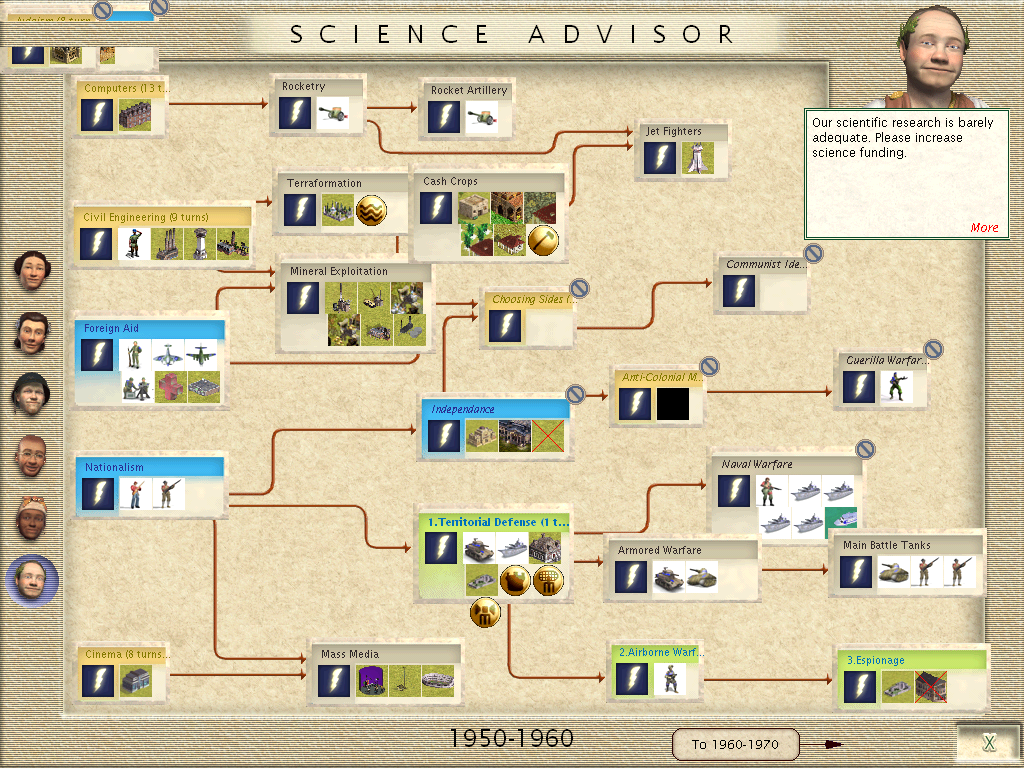
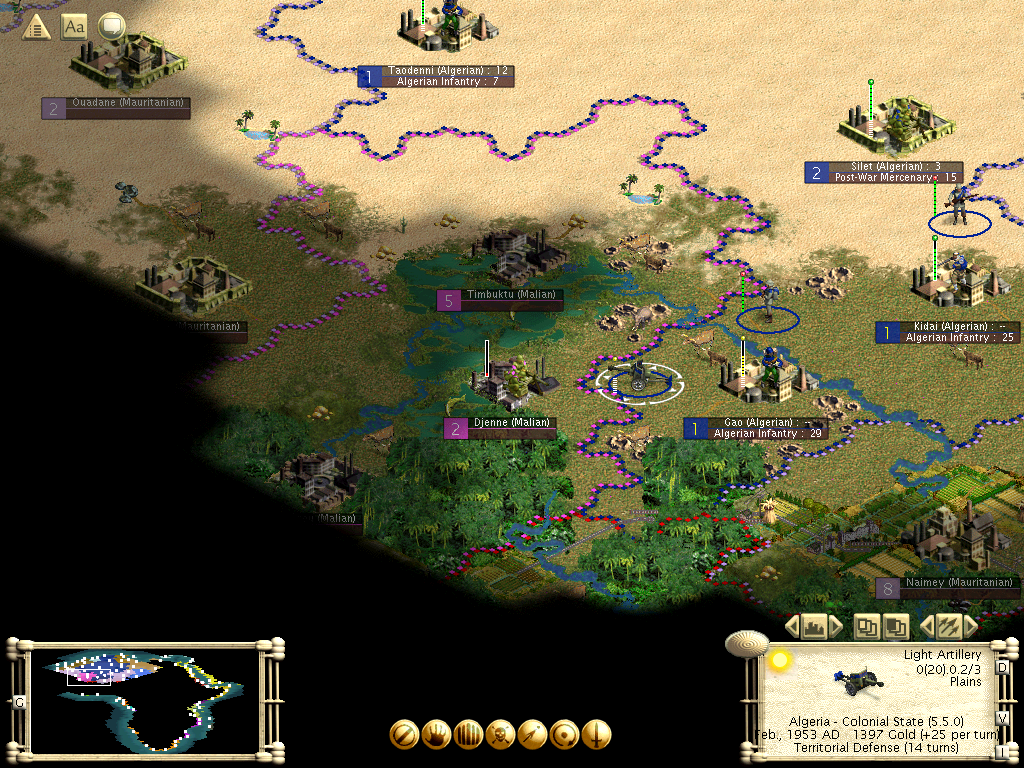
 :
: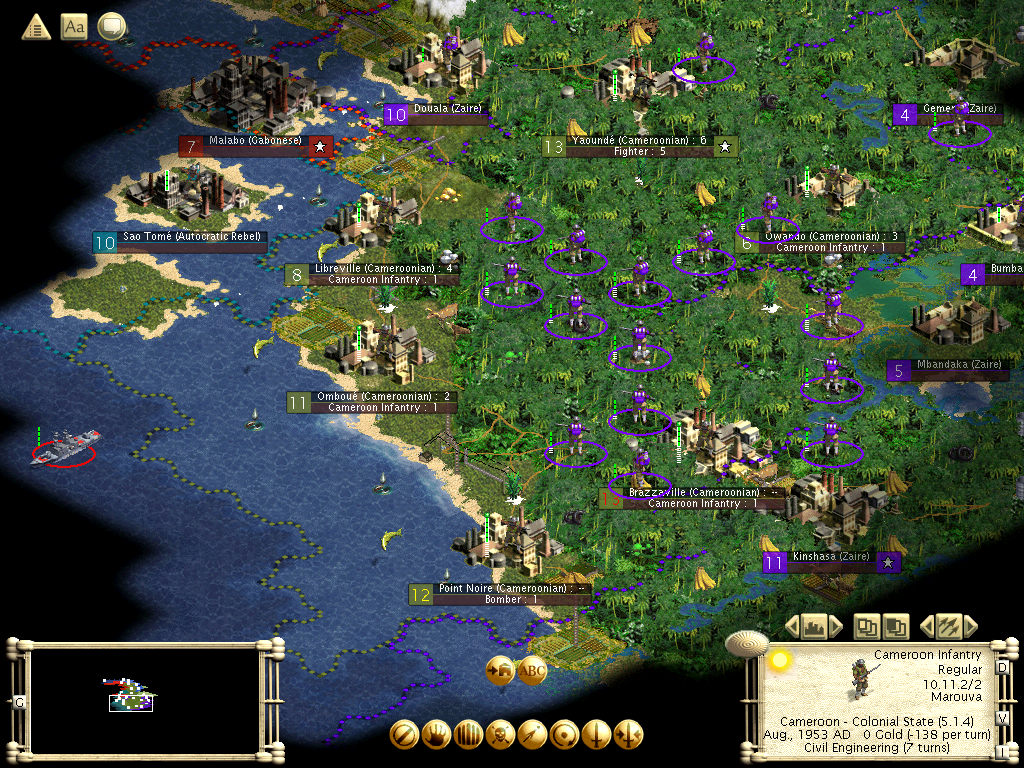
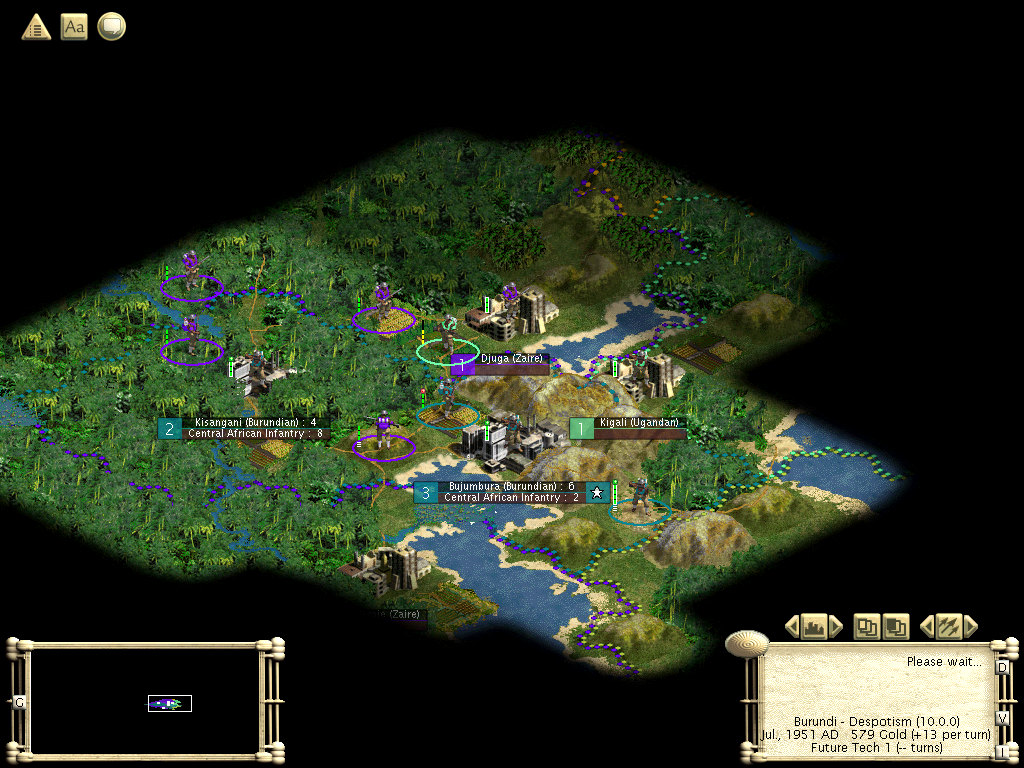
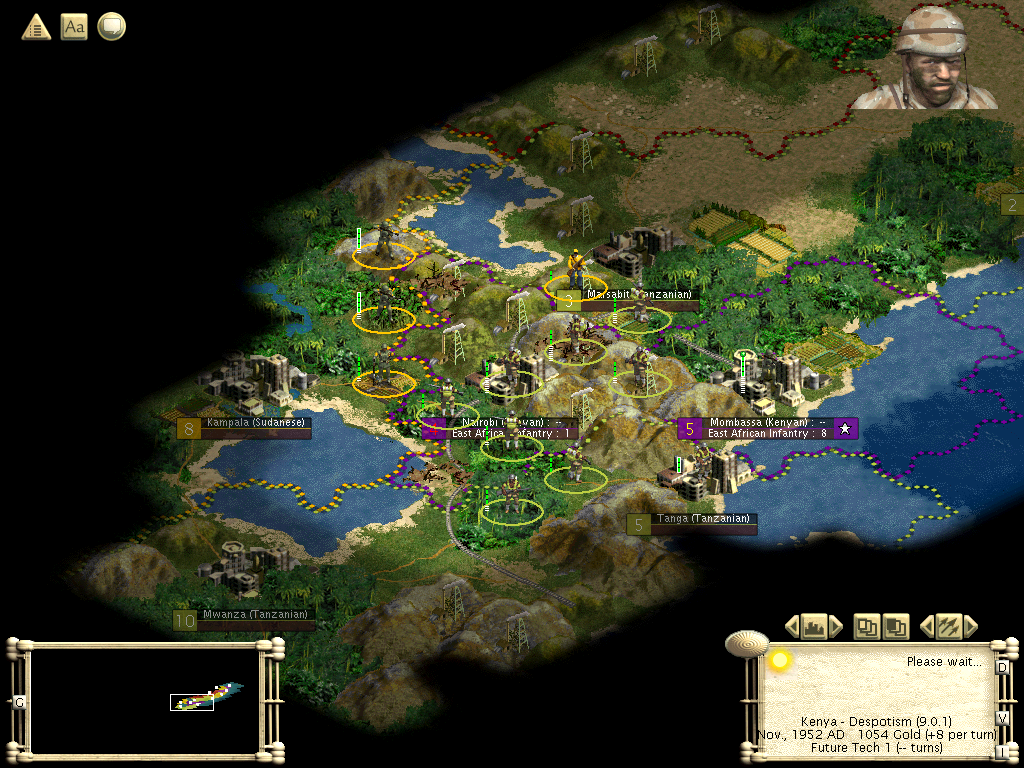
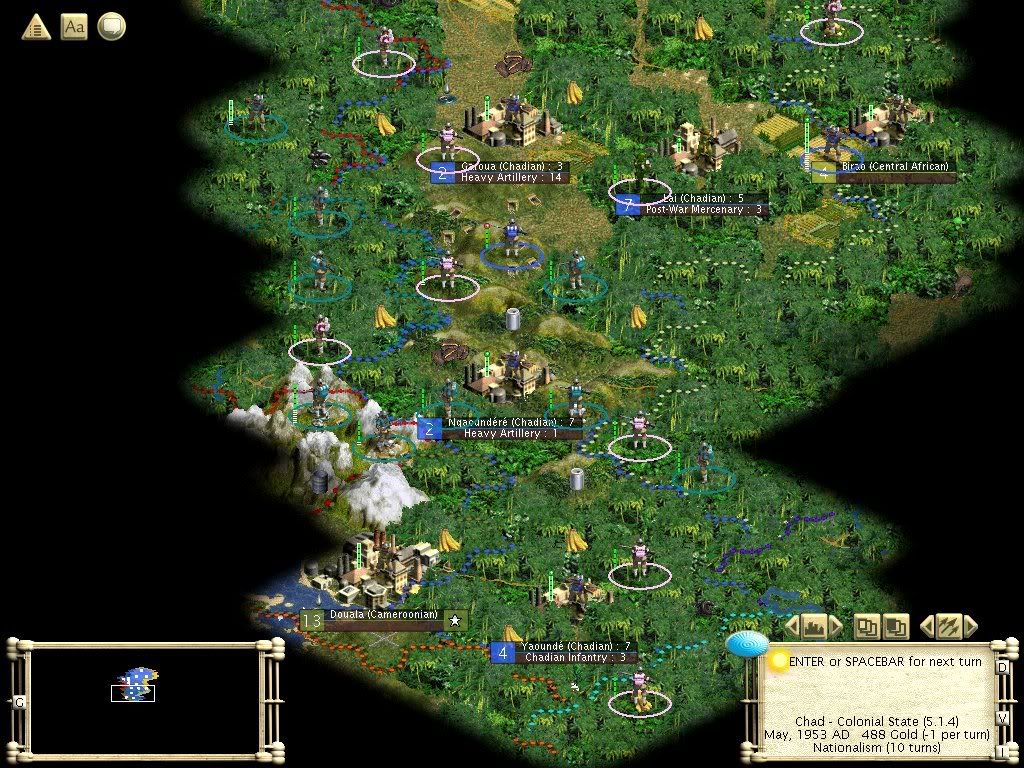
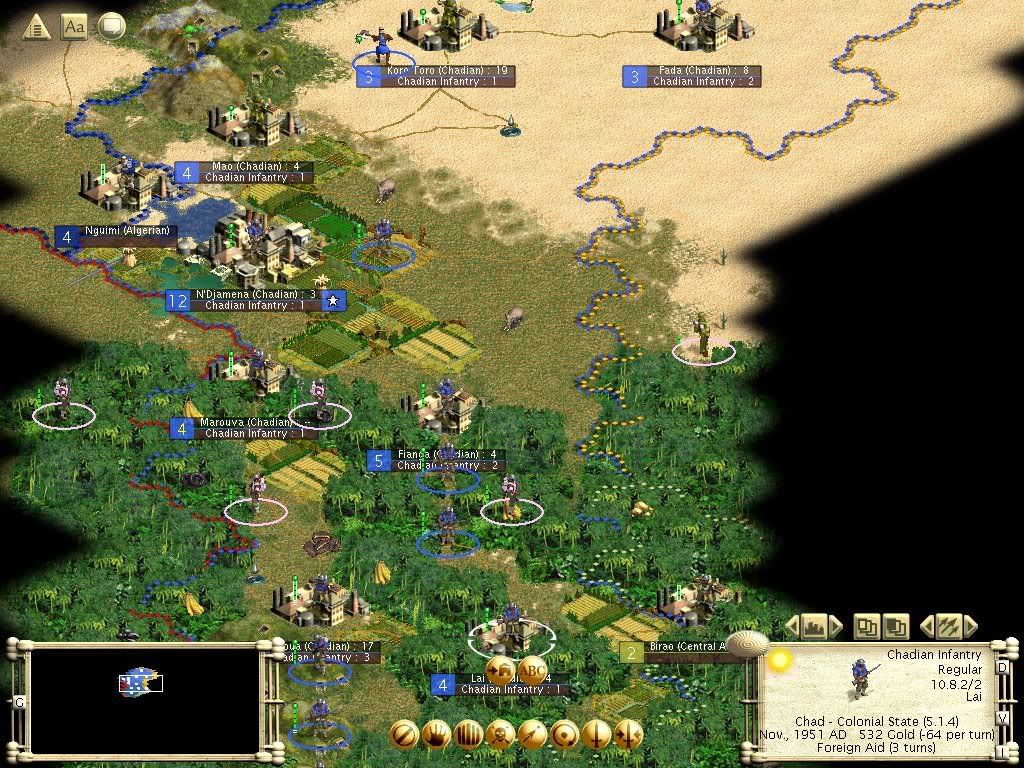
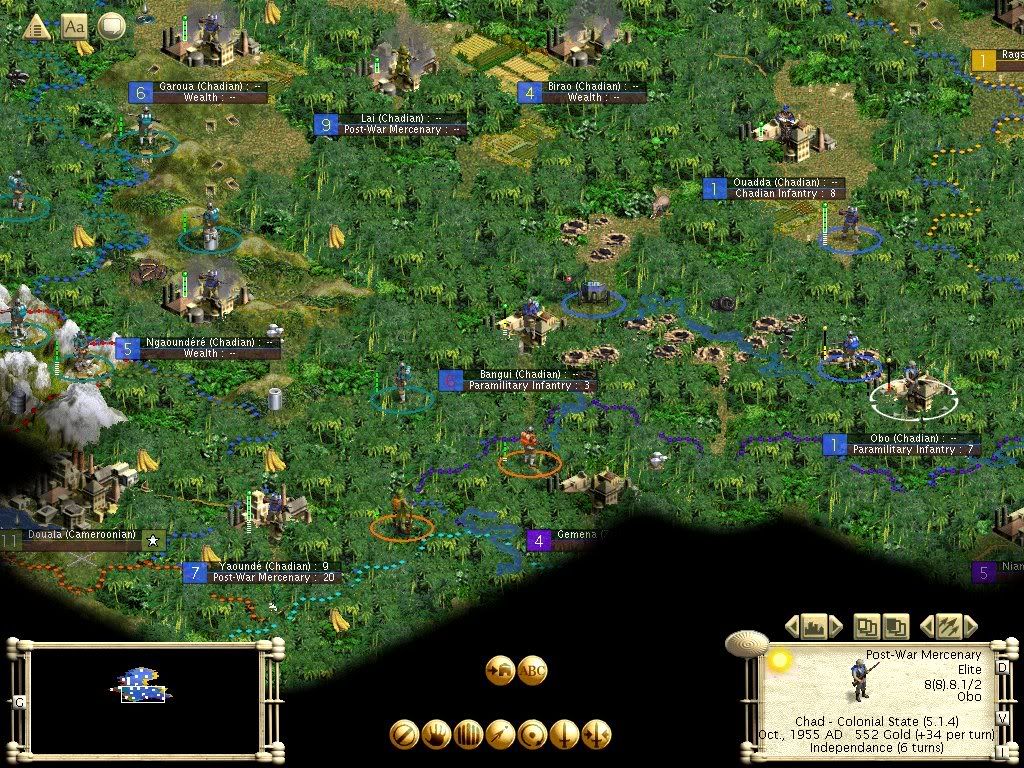
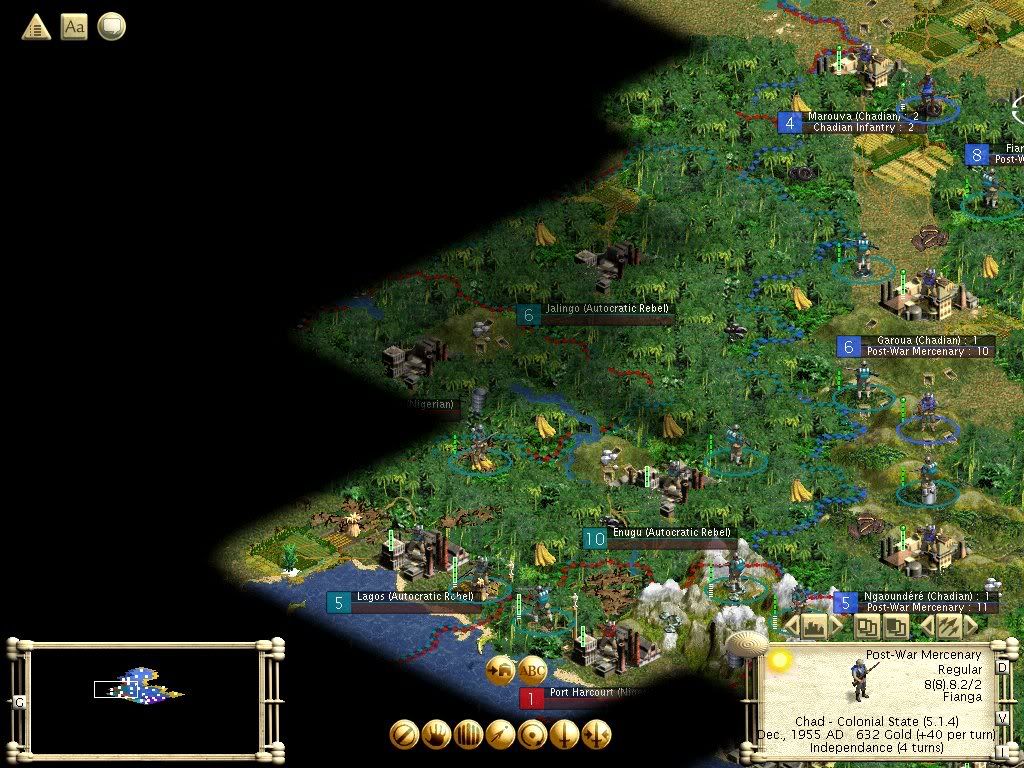
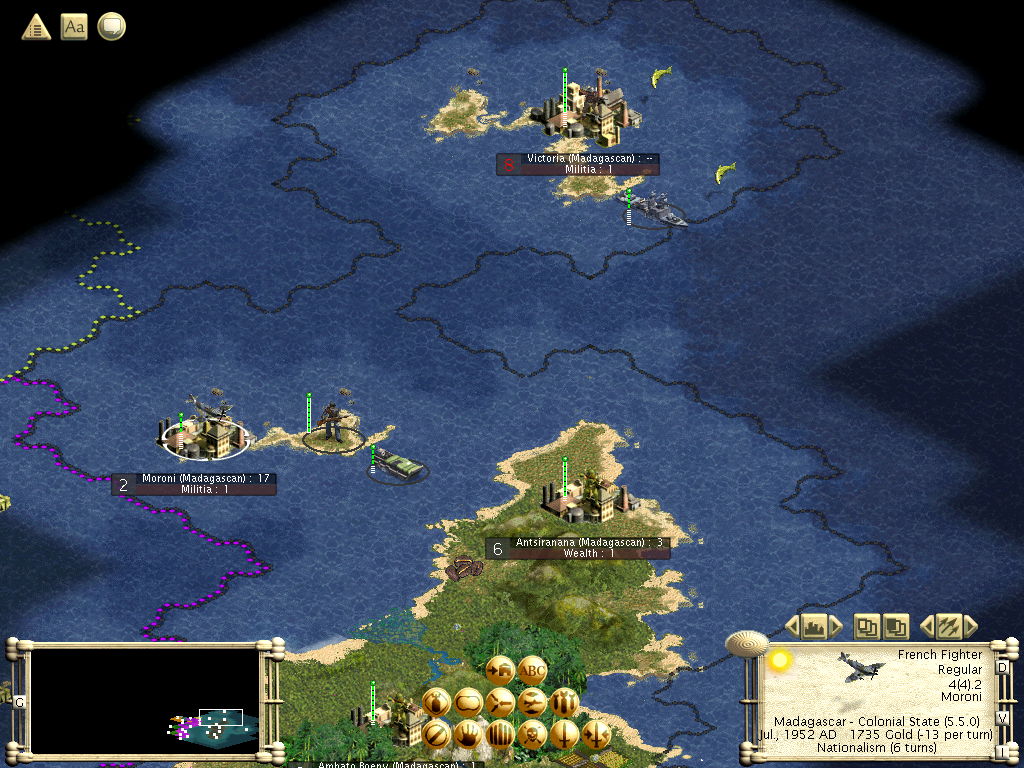
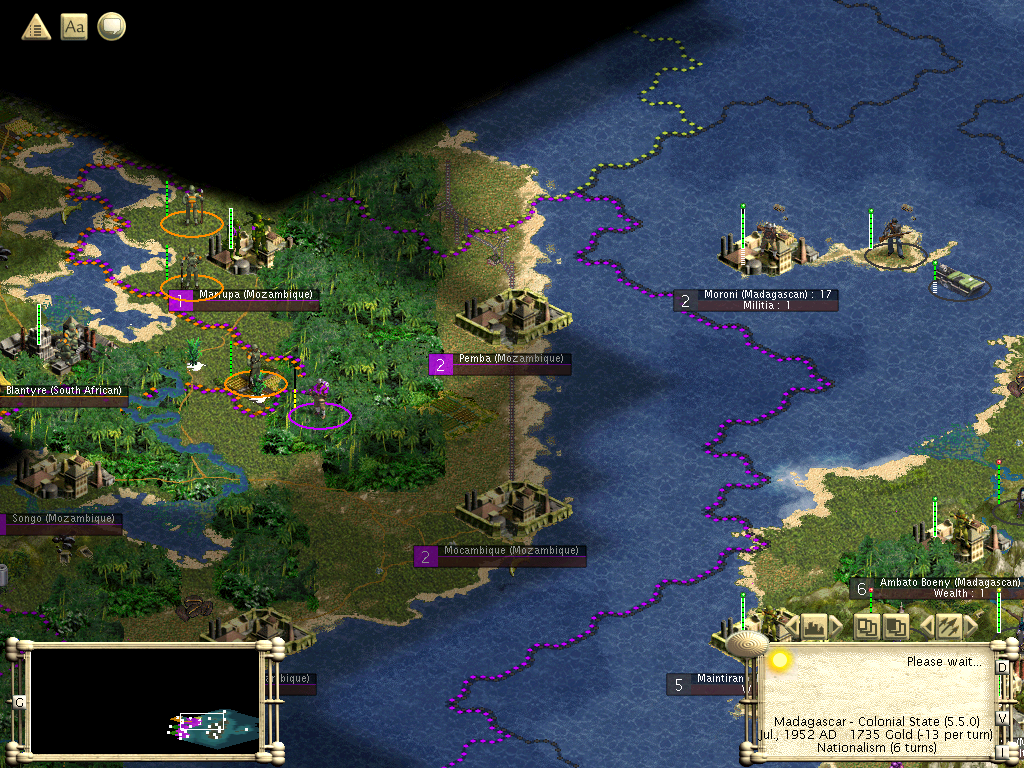
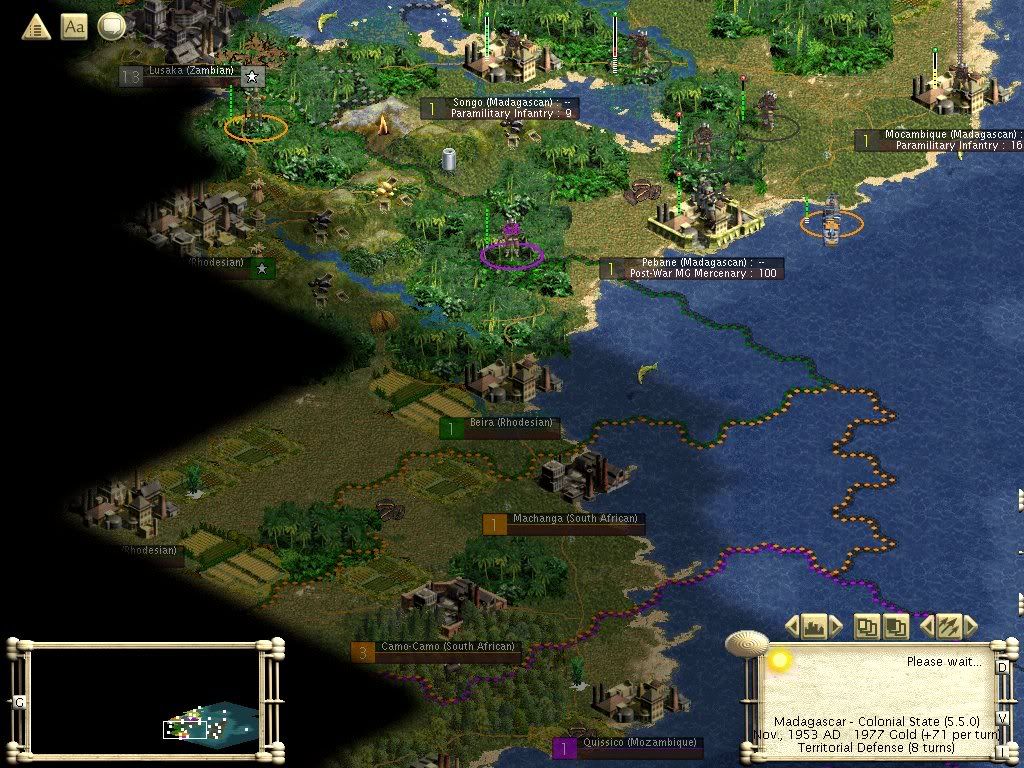
 ) What about the Belgians and UN in the Congo 1960-1964?
) What about the Belgians and UN in the Congo 1960-1964?